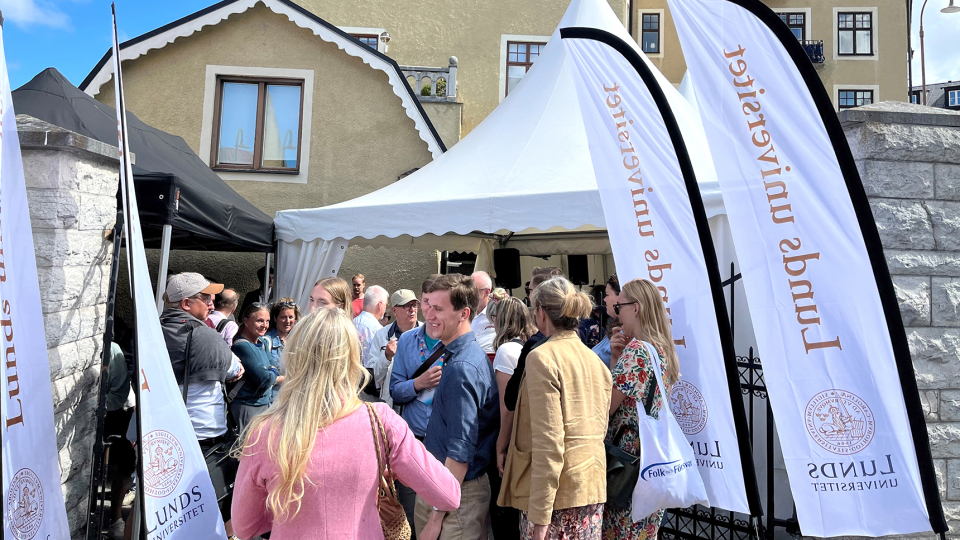A tent for raising serious issues
The LU tent will soon be raised in Visby for two days of panel discussions. The University’s programme for Almedalen Week highlights the global challenges we are facing – such as air pollution and food poverty. However, the programme also inspires hope of finding solutions in external engagement between academia and society at large.
Jessika Sellergren – Published 21 June 2023

One of the University’s representatives in Visby is Vice-Chancellor Erik Renström. He says:
“In recent years, tensions between and within nation states have increased and the world economy has entered a more uncertain phase. In view of this, the discussions we will be having with industry, politicians and other stakeholders in society have a special value in helping us to understand our contemporary society and, hopefully, improve its conditions.”
Focus on air
One area in which there is an aim for improvement is the air we breathe. Many people die each year as a consequence of air pollution – as many as 7 million globally according to the WHO. The WHO is now lowering the maximum levels for air pollution, and as a result the EU is updating its directives. But how are we to keep below the limits that will be set? This is one of the questions that will be taken up in the discussion on how to achieve cleaner air.
Christina Isaxon, an aerosol researcher at the Faculty of Engineering (LTH), is one of the participants. She says:
“As a researcher, I am interested in what is required for us to comply with the maximum levels and how research can contribute. Hopefully, during the panel discussions we can find common paths forward.”
In addition to researchers, the panel members will include decision-makers, interest groups and healthcare representatives. Regarding the air issue, it is no one stakeholder’s concern.
“The air does not recognise national borders. Much of the air pollution we are exposed to in southern Sweden actually emanates from entirely different parts of the world. The air brings pollution here.”
Christina Isaxon considers that the differing legislation between countries on air pollution makes the issue particularly complex and concludes with a rhetorical question:
“Who actually owns the air issue?
Food poverty
The other topics that will be taken up in the Almedalen tent, such as food poverty, are also complex.
Anna Angelin is an associate professor at the School of Social Work. Her research focuses on social deprivation and inequality. She says:
“Social supermarkets are a rapidly growing trend. At these supermarkets, those who can prove they are poor are allowed to buy food that would otherwise have become food waste. But is it actually up to civil society to ensure that everyone can afford to eat?”
Anna Angelin hopes that the panel will provide scope for food poverty in its discussions and provide a voice for those who receive food aid.
“Social supermarkets are an expanding sector that is considered to be sustainable in climate terms. But the question is whether it’s also socially sustainable, and what the long-term effect will be on welfare policy, if poverty is to be solved through gifts of what others don’t want,” says Anna Angelin.
Reflects discussions in society
The University’s Communications Director Johanna Sandahl comments on the programme:
“The programme reflects topics in the current public debate, such as cybersecurity, AI, climate change, sustainability, the Middle East, democracy trends, poverty and elderly care. I hope that the panel discussions will be the starting point for many future collaborations.”
The University’s panel discussions take place on 28 and 29 June. The programme can be found in the Almedalen Guide and in LU’s calendar (in Swedish).
The article is published in LUM, Lund University Magazine, 3:2023.
LTH in Almedalen
LTH is arranging four panel discussions in Almedalen this year:
- Clean air for everyone?
- Circular building industry – how do we get there?
- Electromobility on the rise – are we keeping up?
- Cyber security – can we relax when we connect?
Links open in Almedalsguiden in Swedish.
